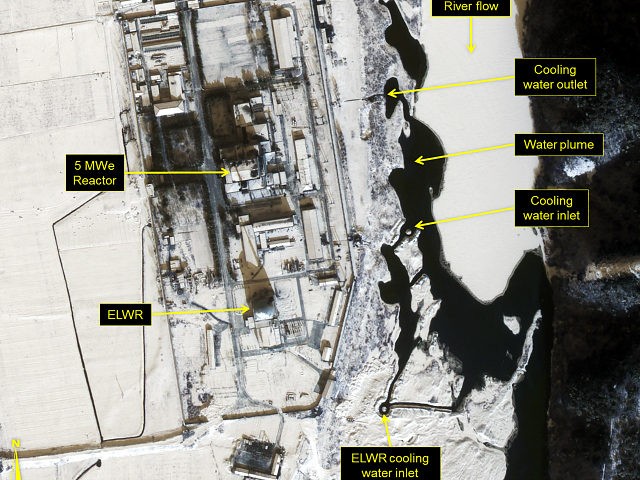A new report on the status of North Korea’s Yongbyon nuclear facility indicates that Pyongyang has restarted its plutonium reactor, possibly to generate enough fuel for a nuclear bomb. North Korea has executed five nuclear tests, which have all received condemnation from the international community.
The report suggesting that the reactor is currently running comes from the website 38 North, which is dedicated to monitoring political activity in the communist country. The website published satellite images that appear to show the presence of small amounts of water in the river near the facility, which would not be present in the otherwise frozen river this time of year if the reactor were not running. “Imagery from January 22 shows a water plume (most probably warm) originating from the cooling water outlet of the reactor, an indication that the reactor is very likely operating,” the report reads, according to the South Korean newswire service Yonhap.
“Currently, most of the river is frozen over except where this water mixes with the river. Currents carry this mix downstream — visible as a plume of ice-free water,” the report continues, noting that the images do not allow for a thorough analysis on how much plutonium the reactor is processing and that it may be “considerable.”
Yonhap notes that the U.S. State Department has responded to the news with a statement once again urging the North Korean dictatorship to abandon its belligerent stand against most of the free world. “We are not going to comment on matters of intelligence,” spokeswoman Katina Adams said in a statement to Yonhap. “We continue to call on North Korea to refrain from actions and rhetoric that further raise tensions in the region and focus instead on taking concrete steps toward fulfilling its international commitments.”
January has been an active month for the dictatorship of Kim Jong-un. While his government stated plainly that “we do not care” about President Donald Trump’s assumption of power in the United States, Kim ordered the acceleration of the development of new intercontinental ballistic missiles (ICBMs) and now appears to be creating new nuclear fuel that could lead to another weapons test. Pyongyang appears keen on not using Trump as the excuse for their illegal weapons development. The state newspaper Rodong Sinmun went so far as to publish a tirade against “total bankruptcy of the Obama administration’s hostile policy towards the DPRK” this week but has rarely mentioned Trump.
South Korean officials appear not to believe that the lack of vocal confrontation with Trump means that Kim is not targeting his new administration. In a Yonhap report last week, for example, a South Korean official noted that Pyongyang appeared to be preparing new missiles, possibly to test during Inauguration Day ceremonies to send a “strategic message” to the new administration.
The missile tests did not occur, and South Korean officials suggest there is no evidence they are poised to launch in the near future, but the evidence that those missiles are ready to launch remains, suggesting Kim is seeking a more timely occasion to test them. “We are closely monitoring any new military activities in the country as it could launch an IRBM at any time if leader Kim Jong-un gives the order,” a South Korean official told Yonhap last week. Kim promised in his New Year’s Day speech earlier this month that North Korea would test new missiles in 2017 as soon as possible.
Reports have warned that Kim had been planning to invest heavily in North Korean military force in 2017 since last year. North Korean diplomat Thae Yong-ho, who defected last year, told CNN that Kim had set a “timetable” on developing potent nuclear weapons. “Due to domestic political procedures, North Korea calculates that South Korea and the US will not be able to take physical or military actions to deter North Korea’s nuclear development,” he claimed, adding that Kim hoped to have full nuclear capabilities by “the end of 2017.”
North Korea executed its most recent nuclear test in September 2016.

COMMENTS
Please let us know if you're having issues with commenting.